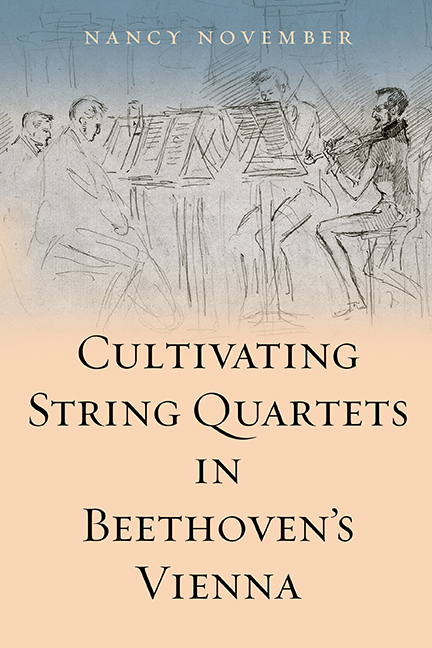Book contents
- Frontmatter
- Contents
- List of Illustrations
- List of Musical Examples
- Acknowledgements
- Introduction
- 1 Defining Chamber Music in the Early Nineteenth Century
- 2 Celebrating Haydn, Cultivating Opera
- 3 Selling String Quartets in Beethoven's Vienna
- 4 Locating String Quartets in Beethoven's Vienna
- 5 Early Nineteenth-Century Performance and Criticism
- 6 Sociability, Showmanship, and Study: ‘Quartet Friends’
- 7 The String Quartet and the Listener
- 8 Schubert's Song, Beethoven's Theatricality
- Epilogue: Constructing ‘Viennese Chamber Music’
- Bibliography
- Index
1 - Defining Chamber Music in the Early Nineteenth Century
Published online by Cambridge University Press: 16 May 2018
- Frontmatter
- Contents
- List of Illustrations
- List of Musical Examples
- Acknowledgements
- Introduction
- 1 Defining Chamber Music in the Early Nineteenth Century
- 2 Celebrating Haydn, Cultivating Opera
- 3 Selling String Quartets in Beethoven's Vienna
- 4 Locating String Quartets in Beethoven's Vienna
- 5 Early Nineteenth-Century Performance and Criticism
- 6 Sociability, Showmanship, and Study: ‘Quartet Friends’
- 7 The String Quartet and the Listener
- 8 Schubert's Song, Beethoven's Theatricality
- Epilogue: Constructing ‘Viennese Chamber Music’
- Bibliography
- Index
Summary
Beethoven lived during a crucial transition period in the history of chamber music. The early nineteenth century witnessed fundamental shifts in music-making, as concert life began, and previously ‘private’ music was moved onto the concert stage. The changing circumstances of chamber music in Vienna during this period warrant detailed exploration not only because of the canonical repertoire that emerged: chiefly string chamber music by Haydn, Mozart, and Beethoven. But also, a much larger body of Viennese chamber music deserves attention, as does the relationship between this music and its context: myths, unexamined ideals, and partial understandings cloud our view of this important cultural nexus. This book explores the ‘cultivation’ of chamber music, especially string quartets, focusing on key agents and factors in Beethoven's Vienna: composers, publishers and publications, performers, venues, critics, audiences, and genres. The following chapters consider the traffic among and between the parties, exploring their actions, relationships, and changing ideas and values.
How did these parties shape the unique cultures of chamber music that arose in Vienna in Beethoven's time? First, a number of terms need to be defined for the particular purposes of this study, including, most importantly, ‘chamber music’. I adopt an early nineteenth-century definition, which differs in crucial ways from the way the term is used today. I go back to this historical definition to understand chamber music's place and role in early nineteenth-century Viennese culture. Three key aspects of chamber music culture at this time, especially in Vienna, are also examined: genre, and the dominance of the string quartet; gender and the predominance of male quartet performers; and class, specifically the ‘middle class’.
Conceptions of Chamber Music around 1800 and Today
One has to consider whether composers in Beethoven's time had a concept of chamber music at all similar to that operating today. The term is, for example, never used in Beethoven's letters, although he frequently mentioned quartets and other genres that we now call chamber music. To anticipate: composers of his day certainly had a working conception of chamber music, but it differed substantially from the one that is now common, which is often anachronistically applied to the music of his era.
Today's definitions of chamber music emphasise instrumentation and ensemble size.
- Type
- Chapter
- Information
- Cultivating String Quartets in Beethoven's Vienna , pp. 6 - 22Publisher: Boydell & BrewerPrint publication year: 2017



